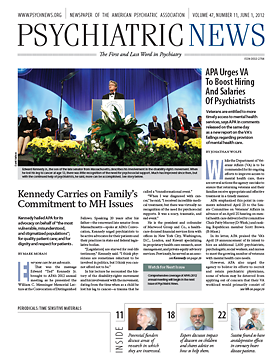Genomewide association studies have proven remarkably successful at identifying genes contributing to a number of diseases, notably breast cancer, lung cancer, diabetes, Parkinson’s disease, multiple sclerosis, lupus, and age-related macular degeneration.
But the largest genomewide association study conducted to date to identify genes contributing to major depressive disorder has not been fruitful.
The study was headed by Patrick Sullivan, M.D., a professor of psychiatry and genetics at the University of North Carolina. The results appeared online April 3 in Molecular Psychiatry.
In the discovery phase of the study, Sullivan and colleagues compared snips of genetic material taken from some 9,000 individuals who had had a major depressive disorder with genetic material from 9,000 individuals who had not had a major depressive disorder.
During a replication phase of the study, they compared snips of genetic material taken from some 7,000 individuals who had experienced major depression with genetic material taken from about 51,000 who never had the disorder.
The researchers were unable to find any snip of genetic material that was present significantly more often in individuals who had had major depression than in individuals who had not had the disorder in the combined discovery and replication analysis.
The researchers did acknowledge that an analysis of snips taken only from women with major depressive disorder and an analysis of snips taken only from people with recurrent major depressive disorder pointed toward a gene that might be involved in major depressive disorder—a gene on chromosome 3—yet neither finding was “strongly compelling,” Sullivan and his coworkers noted.
“What implications do these null results have for research into the genetics of major depressive disorder?” Sullivan and his colleagues asked in their paper. “Why might the results have turned out this way?”
One possibility, they conjectured, is that even though theirs was one of the largest genomewide association studies conducted on a psychiatric disorder— second in size only to one concerning schizophrenia—the sample size may still have been too small to detect genes involved in major depressive disorder.
Another possibility, they suggested, is that gene-environment interactions are crucial in major depressive disorder. If that is so, then perhaps the genetic contributions to the disorder might be uncovered only if genetic and environmental risk factors are explored simultaneously.
Meanwhile, Sullivan and his team are forging ahead in their search for genes that underlie major depressive disorder. “More samples are becoming available,” he told Psychiatric News. “We are also looking across disorders to ask questions such as, ‘Do major depressive disorder, bipolar disorder, and schizophrenia share genetic etiological factors?’ ” Also, “analysis of [gene] copy number variation has provided important leads for autism and schizophrenia and might prove informative for major depressive disorder,” Sullivan and his group noted.
Eight other genomewide association studies have looked for major depressive disorder genes. Only one of them, conducted by German and American scientists, led to a possible candidate—a neuron amino-acid transporter gene called SLC6A15. The gene is expressed in the hippocampus, a brain region implicated in the pathophysiology of major depressive disorder.
Sullivan’s study was funded by the U.S. National Institute of Mental Health, the European Union, the German Federal Ministry of Education and Research, and other organizations.

